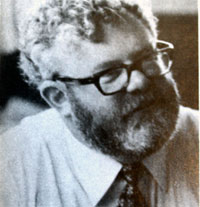 Nobody who works in this place wants one of those brass plaques in the Hall. They memorialise those of us who died in harness. The latest reads:
Nobody who works in this place wants one of those brass plaques in the Hall. They memorialise those of us who died in harness. The latest reads:
IN MEMORY OF
G.H. BEAN B.Sc.
DIED 16TH MAY 1994
FOR 27 YEARS
MASTER AT THIS SCHOOL
When Graham Henry Bean got here in 1968 his reputation had preceded him. He had had an outstanding academic career, being a Senior Scholar in Geology and while on the staff of Selwyn College discovering and describing a small insect which he found in the school grounds and which was previously unknown to Science. Ideas for Science Fairs poured out of him and pupils who followed them up won prizes year after year.
The School has had more than its share of eccentrics. They are the stuff of many stories and while they are more thin on the ground than they used to be, Graham Bean was certainly in their company.
Never one for carrying bureaucratic baggage he was a stranger to deadlines, remembering meetings, compliance, accountability and such products of the more nervous nineties. He remained blithely and magnificently politically incorrect to the end; an administrator’s nightmare.
The dusty workings of institutions never really touched him since he was besotted with a childlike sense of wonder at the natural world. It was a constant source of puzzlement to him that others could not see what was so plain to him: that the universe was a magical place full of beauty and grandeur and charm, and that it was in the disciplined study of Science that one found keys to its treasure chests.
It was a jest of Fate that took him out of pure research into school teaching. What kept him going were the pupils who could see what he really had to offer and who wanted it. Having a big brain wasn’t the criterion, what mattered was curiosity and enthusiasm. Some of these people are now working scientists. And that is his true legacy. In recent years the syllabus for senior school Biology changed (yet again). Mr Bean embraced those changes and the work his students did with Daphnia carinata and Spirodela punctata was ground breaking. He had done a literature search on these two organisms and he guided his classes to correct received wisdom and to find new features and phenomena. It does not really matter that he did not live to publish this material; the young men who were at the cutting edge know what they know.
He was a man of parts – no new mechanical or electronic gizmo escaped his attention, nor did any new recording of classical music nor any new book or magazine that had even a tincture of scientific interest. Part of his extensive library has been gifted to the School.
A taxi driver for many years in his off hours, he featured in a newspaper item where he was cited as a Ustinovian figure with a state of the art stereo playing Mozart, telephoning customers would ask for him especially.
For a generation he was Mr Cricket. If there was a sale of cricket bats or whatever, he knew about it and went out and overspent his budget. While he might (and usually did) lose the invoice he kept a gimlet eye on the gear. Anybody who lost so much as a bail got an earful. Nobody who wanted to play was ever turned away.
I have an abiding memory of a van full of kids in whites, bags of cricket paraphernalia all mixed up with books, magazines, papers, lunch and bits of scientific equipment; timeless music booming out of half a dozen speakers and a gruff, kindly W.G. Grace look-alike at the wheel of the Big Yellow Taxi.
In the words of singer-songwriter Joni Mitchell:
“And a big yellow taxi
Come and took away my old man
Don’t it always seem to go
That you don’t know what you’ve got
Til it’s gone”
Go well old friend
Brian Murphy
